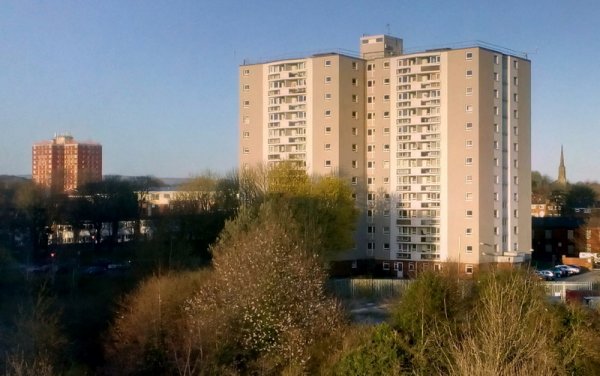Oct 21st 2019, 14:36
Blog 21st October 2019
In this week’s blog, I refer to: Queen’s Speech 2019; House of Commons; Brexit; Devolution; NHS (England); Local Government Association (LGA); Boris Johnson; Local Authority Housing Finance; Birmingham City Council; Manchester City Council; Service Charges; seminars and training.
The Queen’s Speech of 2019 was made on 14th October 2019. It contains some interesting announcements with significant implications for public services.

The Houses of Parliament where the Queen's Speech was made on 14th October 2019
It was an unusual Queen’s Speech in that:
Nonetheless, the Queen’s Speech reflects the government’s intentions and includes the legislation that they would intend to introduce were they to be re-elected.
Prior to the Queen’s Speech, the Local Government Association had requested an English Devolution Bill that would give councils greater powers and funding to build more homes, secure the infrastructure essential to economic growth, and equip people with the skills they need to succeed.
The Queen’s Speech included:
“A white paper will be published to set out my Government’s ambitions for unleashing regional potential in England, and to enable decisions that affect local people to be made at a local level.”
However, the Queen’s Speech merely repeated Boris Johnson’s statements earlier about devolution but did not go as far as the Local Government Association had requested. Details will not be available until the publication of the white paper.
I have written a briefing paper that summarises the main implications of the Queen’s Speech for public services and some of the reactions to it, as well as providing some context and commentary. It includes sections on: Brexit, Public Finances, Devolution, National Health Service, Local Government Finance, Adult Social Care, Education, Housing, Transport & Roads, Police & Justice, Electoral Registration, Environment, Infrastructure, Carry over Bills, and Implications for Scotland.After publishing this briefing paper, a Housing Association Chief Executive wrote to say that:
"I do look forward to your Briefings. They cut through the political 'guff' to look at the real financial implications of government proposals, just like the Institute for Fiscal Studies. Thank you, Adrian."
To view or download your copy of the full briefing paper, please click here.
In many local authorities there is a lively debate about what an appropriate level of housing revenue account balances should be. These balances generally represent surpluses that have been accumulated in years when rent collected exceeded expenditure on housing. On the one side there are those who argue that it is prudent to maintain a substantial level of balances to guard against the risk of over-spending; while on the other side there are those who argue that if the Council has collected rent money from the tenants then it should be spending it on something that benefits the tenants and / or the community. I think both arguments have merit and am often asked what an appropriate level of housing revenue account balances would be.
I don’t think there is a correct answer to this question. The level of balances that it is appropriate to maintain depends on the circumstances in the individual local authority. Relevant factors to consider are the risks that the authority faces, the robustness of its financial management arrangements and the nature of its costs.
In practice, different local authorities maintain widely different levels of housing revenue account balances; and there may be good reasons for this. I have recently carried out an interesting analysis of the housing revenue account balances of 26 local authorities whose accounts I have had reason to study. These 26 authorities hold, between them, over £1.0billion in housing revenue account balances of which £548million are in general balances, £293million in major repairs reserves and £186million in earmarked reserves. Between them, these authorities have an annual rent income of £1.9billion, meaning that their balances, on average, represent 6½ months of rent income. Manchester City Council had the highest level of balances in relation to rent income at 21 months; while Birmingham City Council had the lowest at 1.4 months.
To view or download a copy of the analysis, please click here.
Today I have launched our 2020 series of seminars on ‘All You Want to Know about Service Charges in Social Housing’ with sessions in Leeds and London between February and October 2020. This seminar gives an introduction and overview to this important subject and is fully up to date with all developments.

Flats in Wigan. Service costs and charges are often higher and more complex in flats.
Service charges are an integral part of landlords’ work in financing value for money services and sustaining customer satisfaction. They have always been relatively complex but with increased financial challenges and legal and financial complexity there is an increased need to understand how service charging works.
Housing Associations have traditionally levied service charges with most local authorities in England introducing them following rent restructuring in 2002. Financial constraints are leading many local authorities and housing associations to look at reviewing their approach to service charges. It appears from the global accounts of registered providers that most housing associations are under-recovering service charges by about 12% and the situation in local authorities is similar. This seminar is suitable for people who are not experts in service charges, but who need to understand the basics and achieve an overview of what is going on. It is suitable for people including councillors, board members, housing managers, legal staff, finance staff, tenant representatives and members of the service charges team with limited experience!
The Session covers these issues: